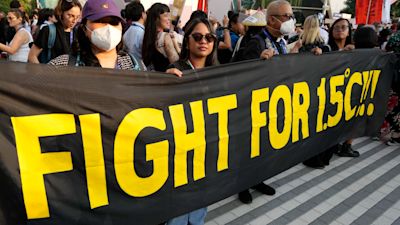United Nations boss returns to COP28 for urgent talks to avert 'climate disaster'

ITV News Health and Science Correspondent Martin Stew outlines what developments he is expecting to happen as COP28 draws to a close
Antonio Guterres has returned to Dubai for the final two days of COP28. The secretary general of the United Nations (UN) tweeted last night that "we are on the brink of a climate disaster and this conference must mark a turning point".
The decision to host the UN’s annual climate conference in the UAE, a country rich in oil, has been contentious.
As has the decision to give the presidency to Dr Sultan Al Jaber, the CEO of ADNOC - the UAE’s state-owned oil and gas company.
Critics argue fossil fuel companies are trying to buy the COP process. Some environmentalists claim big money investment in new technologies to capture carbon, rather than stopping emitting it in the first place, is "greenwashing".
Dr Al Jaber on the other hand says it is inevitable fossil fuels will play a part in the journey to Net Zero - and it’s important to pragmatically bring them into the conversation.
He’s already secured $700m of "loss and damage" funding from richer countries to poorer nations who are being impacted by climate change.
Dr Al Jaber said yesterday that "failure is not an option", but there is still much to agree on.
So, what can we expect before the conference closes on Tuesday?
Global Stocktake
The conclusion of COP28 will see the first global stocktake of how the world is doing in its mission to limit global warming, since the 1.5C target was set in Paris.
We know the world is behind schedule, but it’s the exact wording which will be vital. So, what should we look out for?
Fossil fuel 'phase out' versus 'phase down'
Many environmentalists want the world to stop burning fossil fuels altogether. Australia’s Energy Minister said on Sunday: "We also must face this fact head-on: if we are to keep 1.5C alive, fossil fuels have no ongoing role to play in our energy systems - and I speak as the climate and energy minister of one of the world’s largest fossil fuel exporters.
"And we embrace that fact and acknowledge it because we also live in the Pacific, and we are not going to see our brothers and sisters inundated and their countries swallowed by the seas."
Others say that’s neither realistic nor necessary. In recently re-emerged recordings, Sultan Al Jaber said there is "no science" indicating that a 'phase-out' of fossil fuels is needed to restrict global heating to 1.5C.
To do so he argued would not allow sustainable development "unless you want to take the world back into caves".
Modelling by the International Energy Agency (IEA) suggests that is possible, but only if we dramatically limit emissions soon and capture far more carbon. Neither of which we’re currently doing.
Many oil-rich nations, like Saudi Arabia, Russia, and some other OPEC members, are keen to "phase down" rather than "phase out".
'Unabated' versus 'abated'
That leads us onto the term 'abating'. The exact definition is fluid, but the argument goes that you can emit carbon as long as you capture nearly enough of the same amount.
Countries, including India and China which are heavily reliant on coal, are keen to allow "abated" fossil fuels to continue playing a part in their energy mix.
'Adaption'
We are already living with the effects of climate change. The changes are already "baked in" by the carbon emissions and will only get worse, even if we dramatically cut emissions now.
The idea behind adaption is to invest money to mitigate the impacts of global warming. Building reservoirs, flood defences and cities habitable in the heat aren’t cheap.
The idea is for polluting richer nations to contribute to help poorer nations adapt. The biggest block to this looks to be the USA who (financially) has the most to lose.
What else?
Expect talks on how to cut methane levels, provide more global finance and decarbonise the food industry to go down to the wire.
The next 24 hours (or more if negotiations overrun) will define this COP’s legacy. Will we look back on Dubai as the moment consensus was found - or the moment the process was bought by the fossil fuel industry?
Much is at stake, not least our chances to limit global warming to 1.5C.
COP29 will be held in Azerbaijan next year, a country even more financially dependent on oil than the UAE.
Want a quick and expert briefing on the biggest news stories? Listen to our latest podcasts to find out What You Need To Know...